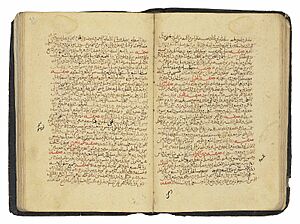'Ali ibn al-'Abbas al-Majusi facts for kids
'Ali ibn al-'Abbas al-Majusi (Persian: علی بن عباس مجوسی) was a famous Persian physician and psychologist who lived during the Islamic Golden Age. He is best known for his important medical book, the Kitab al-Maliki or Complete Book of the Medical Art. In Europe, his name was often changed to Haly Abbas. He died sometime between 982 and 994.
Contents
About 'Ali al-Majusi
'Ali al-Majusi was born in Ahvaz, a city in southwestern Persia (modern-day Iran). He learned medicine from a teacher named Shaikh Abu Maher Musa ibn Sayyār. People at the time thought he was one of the three best doctors in the eastern part of the Islamic world.
He became the personal doctor for a powerful ruler named 'Adud al-Daula Fana Khusraw. This ruler loved medicine and helped build hospitals. He founded a hospital in Shiraz and, in 981, the Al-Adudi Hospital in Baghdad, where al-Majusi worked.
His family had been Zoroastrian, an old religion, which is why his last name was "al-Majusi" (meaning "the Magian" or "Zoroastrian"). However, he himself was a Muslim.
His Famous Medical Book
Al-Majusi is most famous for his book, the Kitāb Kāmil aṣ-Ṣināʿa aṭ-Ṭibbiyya (which means "Complete Book of the Medical Art"). He finished writing it around the year 980. He gave the book to the ruler 'Adud al-Daula, and so it became known as the Kitāb al-Malaki (meaning "Royal Book").
This book was a very organized and clear guide to medicine. It was more practical than some other famous medical books of its time.
What the Book Covers
The Royal Book has 20 main parts. The first ten parts explain the theory of medicine, which means the ideas and knowledge behind it. The next ten parts explain the practice of medicine, which means how doctors actually treat patients.
Some of the topics in the book include:
- Diet and Medicines: It talked about how food affects health (called dietetics) and how to use different natural substances as medicines (called materia medica).
- Blood Flow: He had an early idea about tiny blood vessels, which are now called capillaries.
- Childbirth: He described how the womb moves to help a baby be born. He showed that the baby is pushed out, not just falling out.
Impact in Europe
Later, parts of al-Majusi's book were translated into Latin and used in Europe. One important translation, called the Liber Pantegni, was used at a famous medical school in Salerno, Italy. A full and better translation was made in 1127. His book was even mentioned in Chaucer's famous book, the Canterbury Tales.
Medical Ethics and Research
Al-Majusi's book also talked about how important it is for doctors and patients to have a good relationship. He wrote about medical ethics, which are the rules for doctors to act in a right and fair way.
He also described a way of doing scientific research that is quite similar to how doctors study medicine today.
Understanding the Brain and Mind
In The Complete Art of Medicine, al-Majusi wrote about the brain and how it works. He described the parts of the brain and how it controls the body. He also talked about different mental health problems, such as:
- Feeling very tired all the time (like sleeping sickness)
- Losing your memory
- Feeling worried about your health (like hypochondriasis)
- Being in a deep sleep (like a coma)
- Dizziness (like vertigo)
- Epilepsy
- Feeling sick from being in love (called love sickness)
- Weakness on one side of the body (like hemiplegia)
He believed that keeping healthy through good diet and natural healing was more important than using medication or drugs. He thought medicines should only be used as a last choice.
Mind and Body Connection
Ali ibn Abbas al-Majusi was one of the first to study how the mind and body affect each other. This is called psychophysiology and psychosomatic medicine. In his book, he explained that a person's physical and mental health are connected.
He noticed that people who were happy and content were often healthier, both in body and mind. He wrote that "joy and contentment can bring a better living status to many who would otherwise be sick and miserable due to unnecessary sadness, fear, worry and anxiety." This shows he understood that your feelings can really impact your physical well-being.
See also
 | James B. Knighten |
 | Azellia White |
 | Willa Brown |


